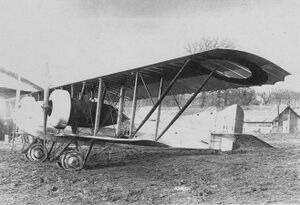Engineering:Caudron G.6
From HandWiki
Revision as of 16:59, 15 April 2022 by imported>Corlink (simplify)
| G.6 | |
|---|---|

| |
| Role | Reconnaissance aircraft |
| Manufacturer | Caudron |
| Designer | Paul Deville |
| First flight | 1916 |
| Primary user | Aviation Militaire |
| Number built | 512 |
The Caudron G.6 was a French reconnaissance aircraft of World War I. It married the wings and engine layout of the unorthodox Caudron G.4 to an all-new fuselage of conventional design. Over 500 of these aircraft were used by the French military for reconnaissance and artillery-spotting duties in 1917 and 1918.
Operators
 France
France
- Aviation Militaire
Specifications
General characteristics
- Crew: Two, pilot and observer
- Length: 8.60 m (28 ft 3 in)
- Wingspan: 17.22 m (56 ft 6 in)
- Height: 2.95 m (9 ft 8 in)
- Empty weight: 940 kg (2,072 lb)
- Gross weight: 1,435 kg (3,164 lb)
- Powerplant: 2 × Le Rhône 9Jb , 97 kW (130 hp) each
Performance
- Maximum speed: 150 km/h (96 mph, 83 kn)
- Endurance: 2 hours 30 minutes
- Service ceiling: 4,725 m (15,500 ft)
- Rate of climb: 4.4 m/s (866 ft/min)
Armament
- 2 × .303 Lewis guns in flexible mount for observer
- up to 100 kg (220 lb) of bombs carried externally
Bibliography
- Cony, Christophe (July 1997). "Aviateur d'Observation en 14/18 (deuxième partie)" (in French). Avions: Toute l'aéronautique et son histoire (52): 10–15. ISSN 1243-8650.
Further reading
- Taylor, Michael J. H. (1989). Jane's Encyclopedia of Aviation. London: Studio Editions. pp. 240.
- World Aircraft Information Files. London: Bright Star Publishing. pp. File 891 Sheet 17.
 |

